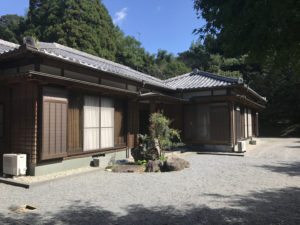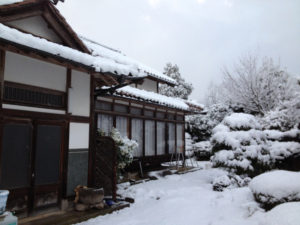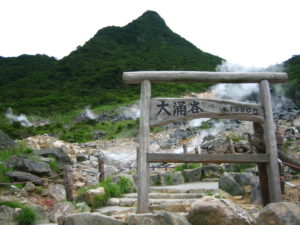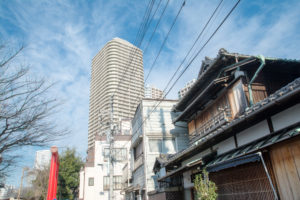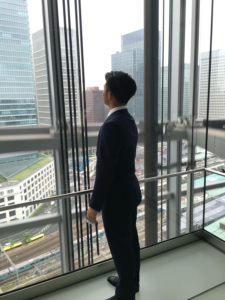
As the book ‘Freakonomics’ (2005 by Steven Levitt and Stephen J. Dubner.) describes
“information is a beacon, a cudgel, an olive branch, a deterrent―all depending on who wields it and how.
It is common for one party to a transaction to have better information than another party.
In the parlance of economists, such a case is known as an information asymmetry.
If you were to assume that many experts use their information to your detriment, you’d be right.
Experts depend on the fact that you don’t have the information they do.”
A real estate agent may see you not so much as an ally but as a mark.”
Too fazing?
Like in the US, many Japanese people believe that the real estate industry in Japan is quite shady.
All the real estate agents are strictly regulated by Building Lots and Buildings Transaction Business Act for both
rent and sales.
The regulations say ‘a Designated Examination Body must appoint examiners to administer qualification Examinations for Real Estate transaction specialists
(hereinafter referred to as “Examiners”) from among persons satisfying requirements as specified by an Ordinance of the Ministry of Land, Infrastructure, Transport and Tourism and have Examination questions prepared and marked.’
To become a licensed broker, one needs to pass the exam.
Some specialists call themselves ‘real estate consultant’ because they are not licensed.
They are not unlawful, but unlicensed brokers are not allowed to lure any investment and not allowed to become the intermediary
for the transaction.
In the meantime, technically speaking, listing agents could control all the information in multiple offer situations.
Efforts by regulators to increase transparency in the real estate industry have been made continuously and every year regulators issue
the new legislation.
With greater transparency, consumers theoretically can also be more confident of their decision to engage agents, and be able to select the agents who best meet their requirements.
How transparent is the industry in Japan now?
Do you think big names like Mitsui or Sumitomo will see you
as an ally?
The short answer is ‘no’.
In general, buyers have one representative in the transaction and sellers have another.
The sides negotiate back-and-forth towards a deal that would be acceptable to both principals but whose outcome depended on the quality of their representation and negotiation.
Representing both sellers and buyers of the property at the same time is called a double agent in real estate parlance,
it is called a dual agent.
It is called in Japanese 両手取引(ryote torihiki) or ‘double-handed’ transaction by the industry jargon.
If your agent is representing either side only, it is called 片手取引(’katate torihiki’ or ‘single-handed’ transaction)
Dual agency is not illegal in Japan but highly controversial.
Why?
Dual agents are supposed to protect the interests of both parties.
The buyer and seller have diverging goals and are both represented by the same agent or brokerage firm
(who has a great incentive to see the deal completed).
Imagine what would likely to happen?
Yes.
Conflict of interest.
It is very common in this type of deal.
Obviously, the buyer wants as low a price as possible, and the seller wants the opposite.
Like all other developed countries, real estate agents in Japan, including myself, work on the commission basis for the transactional business.
(I often work as a real estate consultant who is based on a fee)
The statutory rate for the transaction is maxed 3%(of the property price)+60,000 yen.
The problem is that the agent only stands to personally gain an additional $300 (3%) by selling your property for $10,000 more,
which isn’t much reward for a lot of extra work.
It is not solely the fault of the agents, but I venture to say it is a system failure.
In economics parlance, it is called the ‘agency problem’.
Particular incentives and incentive structures explain a very great deal of the financial world which swirls around us.
In capitalism, people respond to incentives and to their opposite, disincentives.
You can’t blame people who are acting very human.
Therefore when you are selling or buying the property, you need to understand the incentive structure which swirls around the industry.
In this sense, you may want to be extra careful if you wish to negotiate the brokerage rate with your agent.
By hammering their brokerage (by giving disincentives), your property would promise the detriment.
Again it is human nature.
One article in the magazine called ‘ZAI’ in November 2017 by renowned Japanese Diamond publishing company actually
grabbed the media attention by revealing the estimated double-handed transactions.
According to the estimate, the prominent
names like Mitusi, Sumitomo, Tokyu, Nomura are apparently engaging very actively in the double-handed transactions.
Please see the numbers below. (I listed only 10 companies out of 20 companies)
These are the estimated commission rate which each prominent real estate company generated between 2014 and 2016.
Mitsui Fudosan Realty Network 5.39%
Tokyu Livable 4.15%
Sumitomo Real Estate Sales 5.23%
Nomura Real Estate Group 3.74%
Mitsubishi UFJ Real Estate Sales 3.67%
Century 21 Group 4.40%
Mitsui Sumitomo Trust Real Estate 4.04%
Mizuho Real Estate 3.33%
Daikyo (a part of ORIX group) 4.69%
Odakyu Real Estate 4.43%
* Estimate is based on real estate distribution data of the Real Estate Distribution Promotion Center (They serve as a public interest incorporated foundation)
The estimated commission rate is based on the fee income
announced divided by the transaction volume (sales volume).
I don’t have access to the information source of Real Estate Promotion Center but tried to verify the commission which ZAI magazine released
by analyzing the financial report announced by a few of these companies.
And I landed at 5.1 % for Sumitomo, 4.5 % for Daikyo and 6.5% for Century 21.
And yet, the controversial article by ZAI looks reasonably accurate.
As you can see from the estimated commission rate of the major real estate companies are exceeding 4%, and a few companies are enjoying more than 5% commission rate.
This is most probably because they boast the relatively high commission rate working as ‘dual agents.’
It is illegal if a real estate company intentionally crafts two-hand transactions by concealing the property information without any prior agreement with the seller.
Unfortunately, in Japan’s real estate industry, you often encounter dubious double-handed transactions.
How can they craft such dubious deals?
As a matter of fact, their method is very simple and classic.
The industry has the database system called ‘REINS’ where all the agents list each property when they enter into the intermediate agreement with the seller or buyer.
Once the property is listed with REINS, all the
licensed brokers can access the database and look for a property they seek.
However, even the property is registered with the REINS system, the current rules allow the space for manoeuvring by the seller’s agents.
When sellers agents receive an inquiry from a potential buyer, they can they simply say
“The property has been already closed or under negotiation”.
It is very difficult for the principal parties to know the actual dialogues between sellers agents and buyers agents.
It is called 囲い込み (kakoikomi or boxing)
Kakoikomi by intentionally concealing the information is a violation, but sadly such kakoikomi is common.
The rogue real estate companies consistently disregard the inquiries from buyers agents and wait until sellers compromise the price.
For the seller, kakoikomi creates a significant opportunity cost.
Sellers miss opportunities to sell early.
Also, even they could be left only with the option of lowering price.
Remember the agents can gain only an additional $300 as a brokerage even they work hard and manage to sell your property $10,000 more.
Here classic ‘agency problem’ can be seen on a flip side as well.
The agents do not lose much money by lowering
your property price by $10,000.
Moreover, sellers agents can gain more by crafting the double hand’s transactions even the price is lower.
Unfortunately, the double-handed transaction is extensively practised in Japan.
Why do we have controversial double-handed transactions even though they look so dubious?
First, dual agencies are not prohibited by law.
And I said earlier the dual agency is very prone to
the conflict of the interest.
Second, it is almost impossible for the consumers to verify if competing offers are actually registered or not if agents are divulging offers to their clients.
On the other hand, even if it is an intermediary company on the side of the buyer, even if it is registered in REINS and looking at the information and applying to the real estate brokerage company on the seller side, he could say, the property has already entered into contract negotiation.”
It is easy to imagine that a strong incentive to do kakoikomi for real estate companies and salespeople who want to increase commission income.
The transparency is a huge issue.
To avoid such kakoikomi, what can you do?
Is it a good idea to go to a small to medium-sized real estate agents?
In my experience, it is not really a matter of
credentials of the company but who your agent (salesperson) is.
The real estate industry often is regarded as the
bunch of small non-corporate shops.
The business model of the agency is so simple, and once you gain the skills of sales and communication, they can enjoy the freedom in corporate life.
What matter is the individual performance, not the brand of the company?
What about medium and small-sized real estate brokerage companies?
The size of the company does not matter much.
Even if it is not a major real estate brokerage company, by posting the property information on the internet,
there is a good possibility of finding a seller.
Also, there are local and small real estate agents that are strong in certain areas, and they tend to have a lot of property information and information on local buyers.
They have a strong connection with the landowners and landlords of the areas.
The most important thing you need to remember is that the sellers (and buyers) should ask agents a few questions including double-handed transaction
to assess the integrity and attitude of real estate brokerage firm or sales representatives.
You do not know if their answer is genuine; however, at least, by asking such questions you will look sophisticated and don’t look like a mark for the agents.

In conclusion, here are some tips about how you can avoid pitfalls in Japan.
・Notable brands are not the guarantee of the quality of the service.
When you choose the agents, you also need to choose a person in charge of your property.
If you are not happy with a person for some reason, please ask the manager to change the person.
・Try to avoid a salesperson who is overly pushy.
They may keep sending information of the properties even if they don’t match your criteria.
He or she may just be desperate to make a transaction.
・Internet is the currency of the internet. It compresses the gap between experts and consumers.
Please do your homework by studying the relevant information on the web sites service like
AT HOME or SUUMO before you choose your agents.
・It is recommended that you interview a few agents before choosing your agent.
Each agent should have strengths in their sales and marketing.
Please ask your agents if they are willing to make a deal by the single-handed transaction.
They could try to craft the double-handed transaction, but your question will give them good pressure.
・Choosing agents who offer the lowest commission rate is not a necessarily good idea.
By choosing such an agent, your property could lose priority in their mind. Reduced commission means reduced marketing effort.
It will negatively affect your agents.
・Look for someone who is committed with integrity.
Integrity is always a key for success from a business perspective.
・Make sure your agent is focused on the value, not just the price
Your real estate agent should be able to accurately estimate the value of your property and set up a price that accurately reflects the value.
Moreover, when you are briefed the estimated price, please ask them the logic and story they sell.
両手取引 (ryote torihiki, in Japanese)
囲い込み(kakoikomi , in Japanese)

(Shimanto river in Kochi pref)
Toshihiko Yamamoto
Real estate investing consultant and author.
Toshihiko is currently writing a book about real estate investing in Japan
for foreign investors. About the book
Founder of Yamamoto Property Advisory in Tokyo.
International property Investment consultant and licensed
real estate broker (Japan).
He serves the foreign companies and individuals to buy and sell
the real estates in Japan as well as own homes.
He holds a Bachelor’s degree in Economics from
Osaka Prefecture University in Japan
and an MBA from Bond University in Australia
